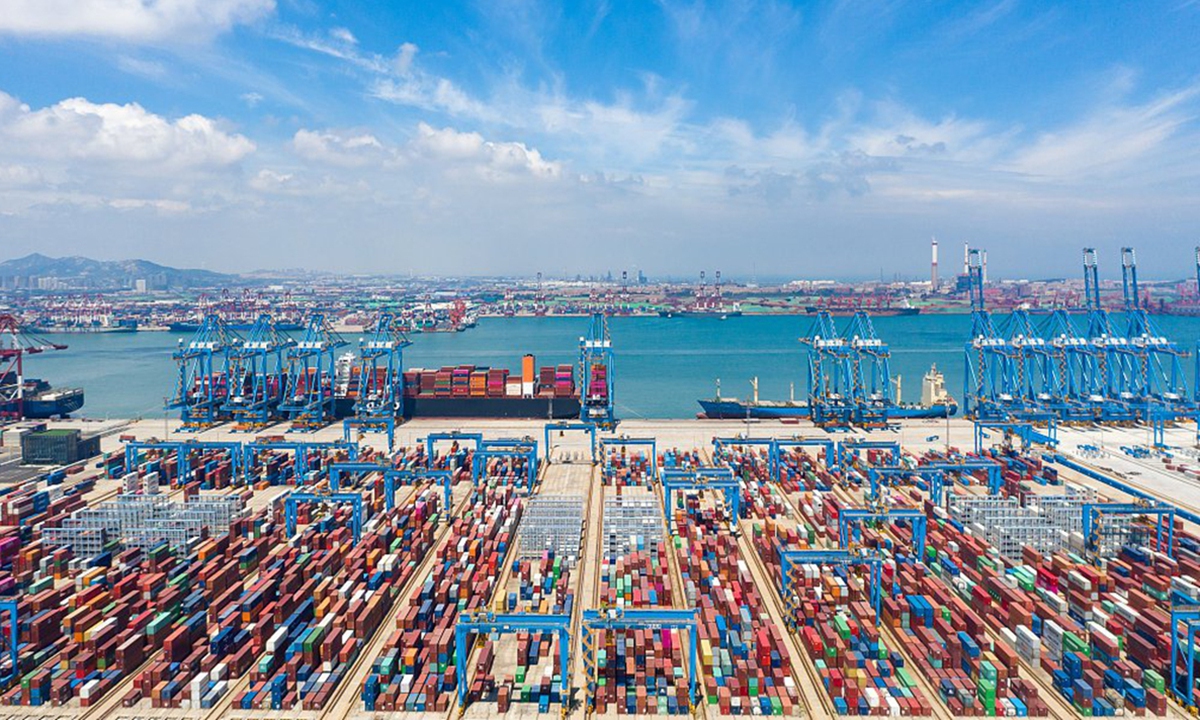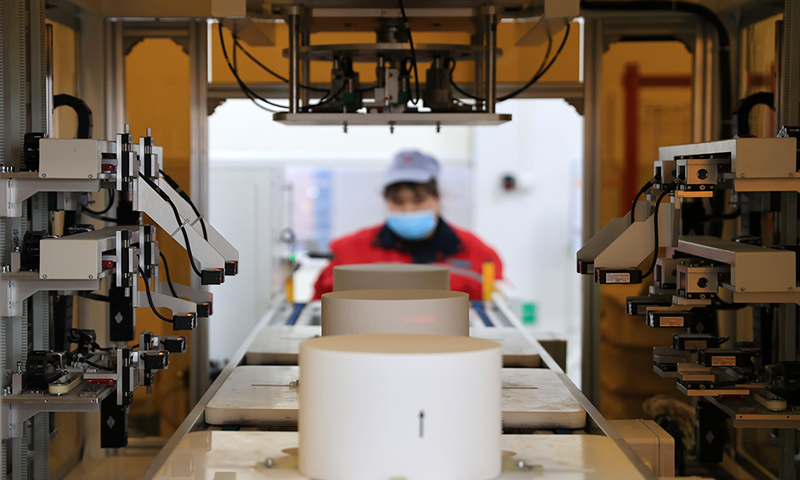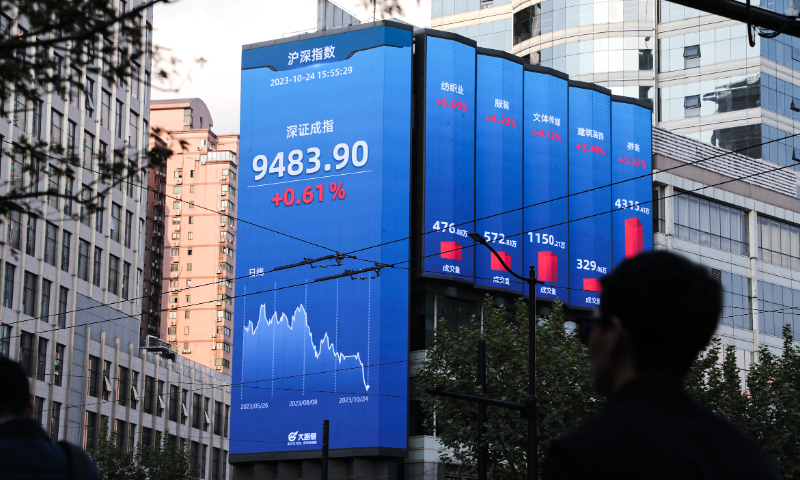China's capital market shows signs of improvement amid rising supportive factors
China has sufficient tools, room to tackle risks, ensure stable market performance: expert

China trade economy File photo: VCG
China's stock market on Friday showed more signs of recovery after a recent downward trend, with major indexes making considerable gains during the day and market sentiment showing improvement, thanks to several confidence-boosting policy measures aimed at lifting expectations and stabilizing overall economic growth.
As China's economy posted better-than-expected growth in the third quarter, much attention has turned to recent fluctuations in Chinese stocks, with some foreign media seizing on declines to smear the Chinese economy with claims of a foreign "capital flight." Analysts said on Friday that while challenges and risks remain for China's stock market, increasing favorable policy measures will ensure overall stability.
Invigorating the capital market and boosting investor confidence has become a major priority for Chinese policymakers, after a tone-setting meeting of the Political Bureau of the Communist Party of China (CPC) Central Committee in July pledged efforts in this regard. More favorable policies could be expected in the fourth quarter and beyond, analysts noted.
Underscoring more policy support for economic development, Xi Jinping, general secretary of the Communist Party of China (CPC) Central Committee, on Friday presided over a meeting of the Political Bureau of the CPC Central Committee, which reviewed a guideline on policies and measures to further promote a new breakthrough in the full revitalization of Northeast China in the new era, the Xinhua News Agency reported.

An employee watches as an AI industrial visual system inspects the quality of particulate filters for cars at a factory in Dongying, East China's Shandong Province. Photo: cnsphoto
Improving signs
On Friday, major Chinese indexes edged up, with the benchmark Shanghai Composite Index rising nearly 1 percent to 3,017.78, surging past the psychologically important level of 3,000 after falling below it last week. The Shenzhen Component Index gained 2.14 percent, while the tech-heavy ChiNext index surged 2.88 percent.
The gains on Friday were significant given that Chinese stocks had been on a downward trend. At the end of September, the Shanghai Composite Index lost 0.3 percent from the previous month, while the Shenzhen Component Index fell 3 percent, according to data from the People's Bank of China, the central bank, on Friday. That downward trend continued in October, with the benchmark Shanghai index falling below 3,000 for the first time since October 2022 last week.
But Chinese stocks have been rising since Tuesday, with the Shanghai Composite Index gaining about 2.52 percent between Tuesday and Friday. This came as China on Tuesday announced a plan to issue an additional 1 trillion yuan ($137 billion) in special treasury bonds in the fourth quarter to help localities rebuild after disasters. The move has been widely seen as aimed at boosting domestic demand and consolidating the economic recovery.
Yang Delong, chief economist at Shenzhen-based First Seafront Fund Management Co told the Global Times on Friday that the Shanghai Composite Index's return to above 3,000 was within expectations, as "favorable policies recently came one after another."
In addition to the 1-trillion-yuan bond plan, another boost for the stock market came from Central Huijin Investment, a state-owned investment fund, which increased purchases of bank stocks and vowed to continue to increase purchases of exchange-traded funds in the future.
Also notable is the increase of foreign capital into the A-share market amid foreign media claims of foreign "capital flight." On Friday, the net inflow of northbound capital stood at 4.67 billion yuan, marking the second straight day of net inflow. This also came as some foreign brokerages raised their forecasts for China's 2023 economic growth, with Citigroup, for example, raising its forecast to 5.3 percent from 5 percent earlier.
"Frequent warm policy winds are also driving a rebound in market sentiment," Yang said.
More support
Market sentiment is also likely to further improve, as more reassuring news emerges. At a recent meeting, Liu Wei, chairman of China's National Council for Social Security Fund (NCSSF), called for full play to be given to the role of institutional investors and long-term funds, and for investment opportunities to be seized while serving the implementation of national strategies and assisting the steady development of the capital market.
At the meeting, Liu noted the increasing volatility in the capital market and risks and challenges for the fund's investment operations, but called for fully recognizing the unchanged trend of China's economic growth and strengthening confidence in the long-term positive trend of China's economy and capital market, according to a statement from the NCSSF on Friday.
Analysts noted that the NCSSF's statement, as well as earlier moves by Huijin, underscored Chinese policymakers' firm resolve to stabilize and invigorate the capital market.
Hu Qimu, a deputy secretary-general of the digital-real economies integration Forum 50, said that China's recent and upcoming policies are aimed at addressing risks and boosting investor confidence.
"Relevant policies are helping to lift the national economy into a virtuous cycle and ensure that China will not have systemic risks this year," Hu told the Global Times on Friday, noting that the 1-trillion-yuan bond plan, which is very targeted, helps root out hidden risks and encourages market entities to invest. "An improving macro environment is very important for the growth in confidence among market entities at the micro level," he said.
Although China's capital market still faces risks of volatility due to a slew of factors, including uncertainty surrounding monetary policies in the US and pressure on real estate companies, analysts noted that China has sufficient policy tools and room to tackle the risks and ensure an overall stable capital market.
"As for these risks, if effective policies can be introduced to solve these problems in a timely manner, then there is no need to worry about the capital market," said Yang.
Among the policy support expected in the fourth quarter is the issuance of the additional 1 trillion yuan in special treasury bonds, which officials and analysts said would help boost domestic demand and lift market sentiment.
Meanwhile, the China Securities Regulatory Commission (CSRC) said on Friday that it would extend the validity period for financial information of restructuring projects involving share issuance, in a bid to reduce restructuring costs and speed up the restructuring process.
CSRC officials also said at a meeting in Shanghai that the regulator will continue to focus on protecting the legitimate rights and interests of investors, improving the full-chain real estate investment trusts (REITs) supervision system, and actively creating a good development environment and atmosphere, according to media reports on Friday.
Also in focus is a possible major meeting on financial policy. Bloomberg reported this week that China plans to convene a key financial policy gathering which takes place once every five years early next week to prevent risks and set medium-term priorities for the $61 trillion industry. There has been no official confirmation of such a meeting as of Friday.


